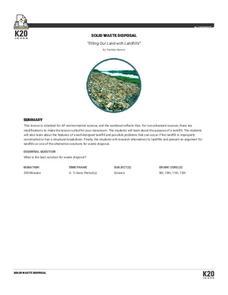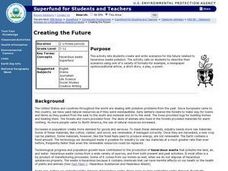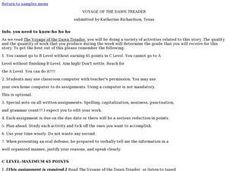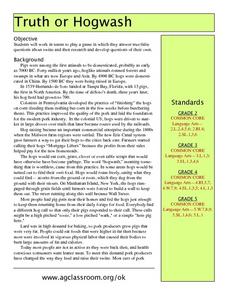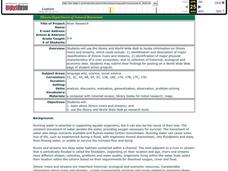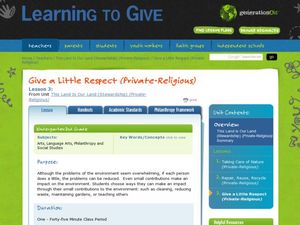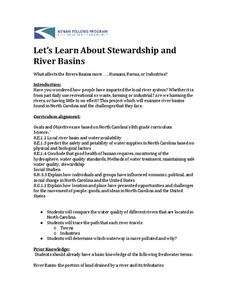K20 Learn
Filling Our Land with Landfills: Solid Waste Disposal
New ReviewThough it comprises only 5 percent of the world's population, the US generates 40 percent of the world's waste. Scholars learn about landfills, their safety, and other solid waste methods. They use experiments and research to learn more....
Curated OER
Disposing Garbage
Students explore environmental cleanliness by completing a worksheet in class. In this waste management lesson, students identify the technological advances in society and how they increase waste production our planet is unable to deal...
Curated OER
What Do We Need In Our Environment To Survive?
Students discuss and write about waste management to save the environment. In this environment lesson, students discuss what an alien coming to Earth would notice about the environmental needs of humans for survival. They pretend that...
California Academy of Science
Exploring the Impacts of Feeding the World
Approximately 50 percent of people in the world who are chronically hungry work in agriculture. While it seems counter-intuitive, the farther you live from a farm, the more food options are available. Scholars explore concepts related to...
Curated OER
Conservation in Costa Rica
Students brainstorm what they do that requires land use and use a worksheet to calculate their footprint (the total area of land and water required to produce all the resources they consume). They then compare their footprints to each...
Curated OER
Creating the Future
Students work together to develop and write scenerios for the future of hazardous waste cleanup. They share their scenerios with the class. They complete activities as well.
Curated OER
Sustainable Island Development
Students explain how the basic human needs of a large group of people can be met. They describe and evaluate alternative methods for providing water and food, producing electricity, handling wastes, and transporting goods and people....
Curated OER
Interview the Elders
Students prepare a list of questions about the past and present in regards to dealing with waste and the natural resources. They conduct interviews with tribal Elders and record their statements.
Curated OER
VOYAGE OF THE DAWN TREADER
Students create and write context sentences leaving a blank for each vocabulary word. Exchange papers with a classmate to fill in the blanks or use vocabulary cards to show answers. Students research the Isle of Wight in books on Great...
Curated OER
Ecology of the Dump
Middle schoolers recreate landfills in petri dishes, observe relative biodegradability in a year-long project, and isolate a cellulose degrading bacteria while discovering the need for recycling and the serious problem waste management...
Curated OER
Nuclear Storage on the Goshute Reservation
Students discuss weather or not the Goshutes should be allowed to store nuclear waste on their reservation. They work in groups and research an assigned topic, locate relevant sources then present their investigation to the class
Curated OER
Looking for the Dirty Scoop
Students read "The Negative Effects of Urban Sprawl." They discuss the main forms of transportation in their city and conduct research about the development of their community in terms of land use. Students sketch a map of their city and...
Curated OER
Truth or Hogwash
Explore the history of domesticated pigs and their important byproducts. After discussing the use of pigs, class members create game boards describing the animals. While playing the game, they determine if the answers are true or...
Curated OER
Camp and Travel on Durable Ground
Students explore environmental awareness by conducting a class discussion. In this camping lesson, students discuss different methods to minimize their human imprint on the land they are camping or hiking on. Students participate in a...
Curated OER
River Research
Learners use the internet to research the streams and rivers found in Illinois. Using the information, they identify and describe the rivers and streams along with the physical characteristics of a river ecosystem. They share what they...
Annenberg Foundation
Rhythms in Poetry
Rhyme, rhythm, free verse, imagery: Do these words describe poetry, or jazz music? The answer is both! A resource explores these similarities as scholars watch a video, engage in discussion, read author biographies, write poetry and...
Curated OER
Give a Little Respect
Students recognize the importance of helping the environment. In this improving the environment lesson, students create a task that will improve the environment. student make decisions about how to share the work to get the job done....
California Academy of Science
Exploring Our Growing Need for Water
Pupils explore the amount of water people use in agriculture and for personal use. They compare water usage for various crops to that of raising animals before considering solutions for increased access to safe drinking water worldwide....
Kenan Fellows
Let's Learn About Stewardship and River Basins
What does it mean to be a good steward? Middle school environmentalists learn to care for their state's waterways through research, a guest speaker, and poster activity. Groups must locate and learn more about a river basin and the human...
Florida Department of Environmental Protection
Water's Journey Expedition
Step into a scientist's shoes to go online and discover the Florida Springs Expedition, and participate in two activities focusing on how humans impact the environment. The first activity asks scholars to summarize the six dispatches at...
Chicago Botanic Garden
Greenhouse Gas Emissions — Natural and Human Causes
What impact do humans have on greenhouse gas emissions? What are the natural causes of these gasses? Thanks to the carbon cycle, carbon dioxide eats away at the earth's atmosphere with the intensified help of humans. Young scientists...
Chicago Botanic Garden
Greenhouse Gas Emissions – Natural and Human Causes
Part three in the series of seven has pupils discussing the different greenhouses gases, learning about the carbon cycle, and then watching a short video about the carbon cycle. Based on their knowledge, individuals complete a greenhouse...
Chicago Botanic Garden
Personal Choices and the Planet
The last activity in the series of four has individuals determine steps they can take to reduce their carbon footprints and then analyze their schools' recycling programs. Through a sustainability audit, they identify how and where their...
Chicago Botanic Garden
Personal Choices and the Planet
How big is your footprint? Activity three culminates the series by having groups complete carbon footprint audits with people in their schools and/or around the districts. Groups then gather their data, create a presentation including...


